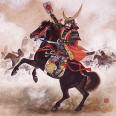 |
|
 |
|
|
|
The Samurai The samurai's legacy begins in the early 8th century. The imperial family had grown too big for court life and, through the Taiho Law Code of AD 708, rescinded the titles of nobility from those family members six generations removed from the emperor. Many of these demoted family members relocated to Japan's frontiers to start their own settlements. When the power of the central government started to diminish early in the 9th century, the local governments hired family members as a police force. Later, these warriors were expanded to include kenin (or housemen) and they became know as bushi (warriors) or samurai (knights or retainers). At first these samurai were used as guards for going to and from the capital. As the local land owners became restless, however, they were used for protection and expansion of their lord's properties. It was at this point that samurai's loyalty became focused on their lord rather than the central government. Because of the inherently aristocratic system of these fiefdoms, the position of samurai became hereditary. Other soldiers could earn the right to become samurai, but those warriors who could trace their lineage back to the earliest days had more prestige. As more and bigger battles between the families were fought, the legend of the samurai grew. Honor became center of the samurai's philosophy, even to the point of following their masters into death in acts of seppuku (ritual suicide). In later years seppuku became the ultimate act of absolving themselves of dishonor. When Japan finally accepted permanent trade with the west, the samurai classes were abolished in what is now called the Meiji Restoration. They of course did not go without a fight. Their legend lives on just as strong as ever in Japan. The principles practiced by business men are founded in the ways of the samurai and their code of ethics became the foundation for all citizens of Japan. As Inazo Nitobe puts it in his book Bushido: The Soul of Japan: "What Japan was she owed to the samurai. They were not only the flower of the nation, but its root as well. All gracious gifts of Heaven flowered through them. Though they kept themselves socially aloof from the populace, they set a moral standard for them and guided them by their example." (pg 159-160) Click on one of the icons below to find out more.
|
|
Web site designed and researched by Travis Moorhouse Last updated Monday, December 04, 2006 |